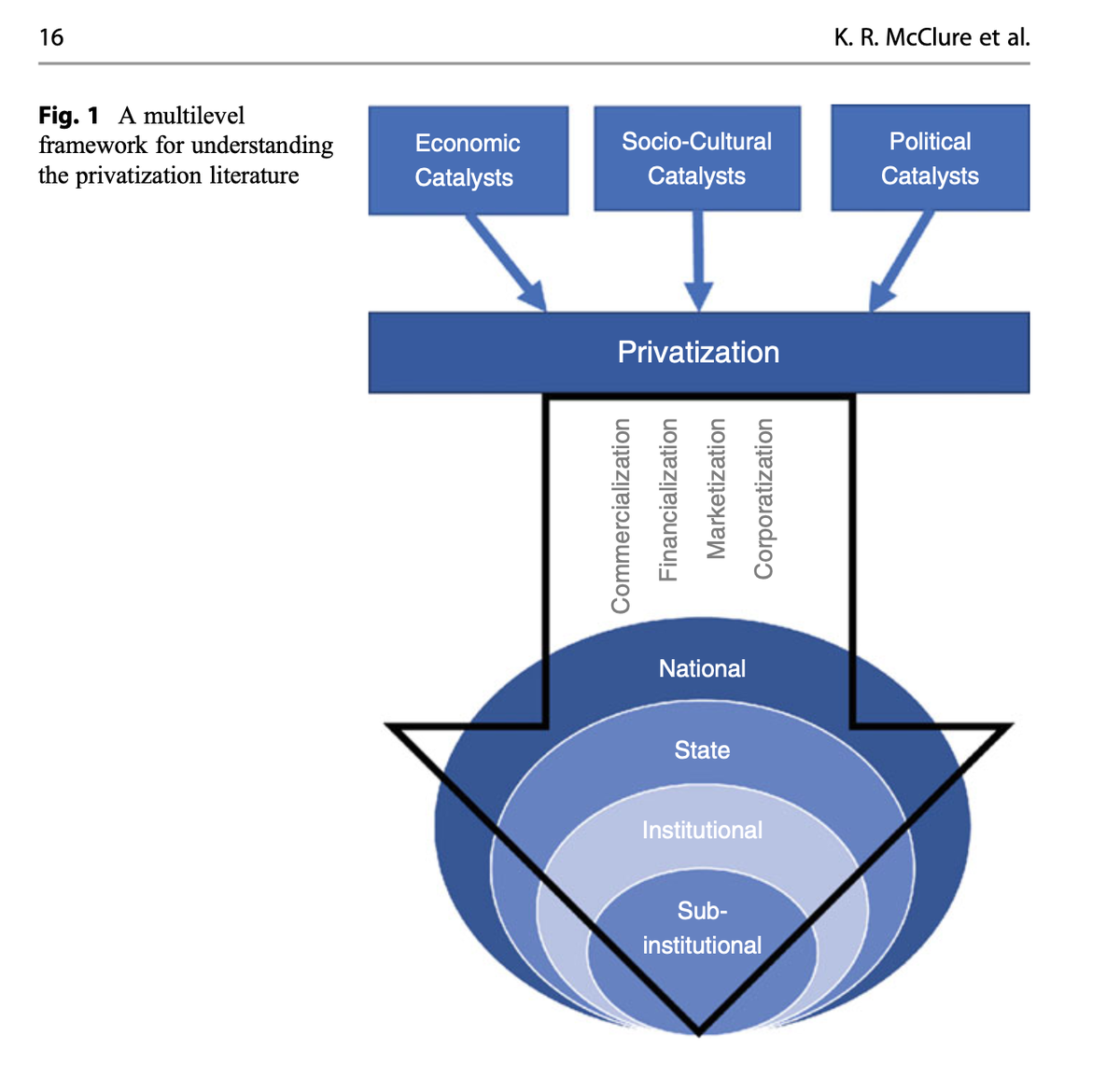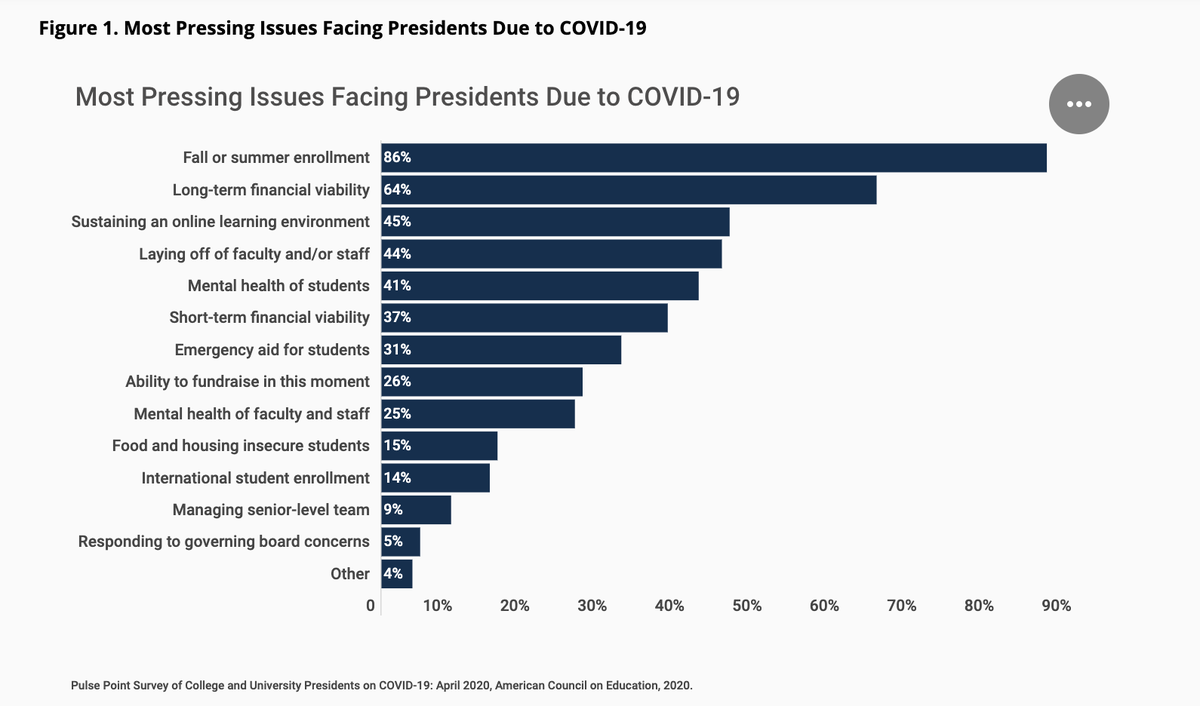1. What we’re seeing right now from colleges in terms of their responses to COVID is unmistakably a product of privatization. And COVID will likely intensify privatization processes in higher ed. Let’s explore some of the connections.
Warning: long thread (1/20)
Warning: long thread (1/20)
2. First, let me note that my understanding of privatization in higher ed draws on this multi-level framework I co-created w/ @SNBarringer and @HigherEdSoc. You can read all about the framework in this synthesis of privatization literature we wrote. https://link.springer.com/referenceworkentry/10.1007%2F978-3-030-31365-4_13">https://link.springer.com/reference... (2/20)
3. One easy connection is that covid has already led to state budget cuts for public higher ed. By my count, at least a dozen states have cut or discussed cutting state appropriations, as this article from May details.
https://www.insidehighered.com/news/2020/05/15/size-state-budget-cuts-becomes-clearer">https://www.insidehighered.com/news/2020... (3/20)
https://www.insidehighered.com/news/2020/05/15/size-state-budget-cuts-becomes-clearer">https://www.insidehighered.com/news/2020... (3/20)
4. In many states, funding for public higher ed had not fully recovered from the Great Recession. COVID will accelerate a decades-long state retreat from investing in higher ed that, for many, is the hallmark of privatization. https://shef.sheeo.org/report/ ">https://shef.sheeo.org/report/&q... (4/20)
5. In addition to state funding cuts, many observers & organizations have pointed out that federal relief for higher ed to appropriately respond to COVID has been inadequate. Congress has been much more interested in helping companies than schools. https://www.acenet.edu/News-Room/Pages/Coronavirus-Stimulus-Bill-Allocates-14-Billion-to-Higher-Education-Higher-Education-Community-Says-More-Is-Needed.aspx">https://www.acenet.edu/News-Room...
6. Another connection is that colleges’ responses have emphasized a private good, consumer-driven ethos.
@tressiemcphd explains in this interview that by starving institutions for so long, customers have replaced citizens in many fall plans. https://www.msnbc.com/all-in/watch/harvard-princeton-roll-out-plans-for-fall-amid-trump-pressure-to-reopen-87177797793">https://www.msnbc.com/all-in/wa... (6/20)
@tressiemcphd explains in this interview that by starving institutions for so long, customers have replaced citizens in many fall plans. https://www.msnbc.com/all-in/watch/harvard-princeton-roll-out-plans-for-fall-amid-trump-pressure-to-reopen-87177797793">https://www.msnbc.com/all-in/wa... (6/20)
7. This customer-centric approach to COVID responses is evident in the way students are prioritized in re-opening plans.
As Mitch Daniels noted, students overwhelming want to come back to campuses and it& #39;s our duty to oblige. https://www.washingtonpost.com/opinions/why-we-have-a-responsibility-to-open-purdue-university-this-fall/2020/05/25/da3b615c-9c62-11ea-ac72-3841fcc9b35f_story.html">https://www.washingtonpost.com/opinions/... (7/20)
As Mitch Daniels noted, students overwhelming want to come back to campuses and it& #39;s our duty to oblige. https://www.washingtonpost.com/opinions/why-we-have-a-responsibility-to-open-purdue-university-this-fall/2020/05/25/da3b615c-9c62-11ea-ac72-3841fcc9b35f_story.html">https://www.washingtonpost.com/opinions/... (7/20)
8. The focus on student preferences is another connection to privatization. Most institutions pull the majority of their $ from tuition and are hypersensitive to fluctuations in enrollment. This explains why college leaders in one survey said enrollment was their #1 worry. (8/20)
9. Tuition dependence due to privatization can shed light on why college leaders, as @rkelchen suggested, expressed such optimism about re-opening, even if the chances of actually doing so were low. They didn’t want to risk losing students. https://www.chronicle.com/article/Colleges-Aren-t-Reopening-in/248803">https://www.chronicle.com/article/C... (9/20)
10. The need for tuition money also helps to explain the deep concerns in higher ed around international student enrollment caused by COVID and the Trump administration.
https://www.insidehighered.com/news/2020/05/26/colleges-expect-few-new-international-students-will-make-it-their-campuses-fall">https://www.insidehighered.com/news/2020... (10/20)
https://www.insidehighered.com/news/2020/05/26/colleges-expect-few-new-international-students-will-make-it-their-campuses-fall">https://www.insidehighered.com/news/2020... (10/20)
11. Another connection relates to financialization, which we might think of as a focus on wealth generation through investing in financial markets and/or incurring significant debt to achieve institutional goals. (11/20)
12. In terms of the wealth generation through investment, we can look at institutions’ (sometimes justified) reluctance to spend endowments as a signpost of privatization.
https://www.insidehighered.com/news/2020/05/22/colleges-faced-whether-increase-endowment-spending-finances-grow-more-dire">https://www.insidehighered.com/news/2020... (12/20)
https://www.insidehighered.com/news/2020/05/22/colleges-faced-whether-increase-endowment-spending-finances-grow-more-dire">https://www.insidehighered.com/news/2020... (12/20)
13. In terms of incurring debt, we can look at institutions securing lines of credit as a financial backstop, for example https://www.insidehighered.com/news/2020/04/03/alabama-system-open-250m-lines-credit">https://www.insidehighered.com/news/2020... (13/20)
14. I think it’s also worth noting that debt plays a role in some of the decision-making around fall. Some campuses have a fair amount of debt in their residence halls to pay off and need rent to avoid defaulting on obligations. https://www.insidehighered.com/views/2020/06/17/colleges-may-be-partly-motivated-reopen-campuses-due-dorm-and-dining-hall-debt">https://www.insidehighered.com/views/202... (14/20)
15. Which brings up another connection: auxiliary revenue. Colleges have increasingly turned housing, dining, conferences, and so forth into profit centers. COVID has seriously messed with this revenue stream, shaping some decisions about fall.
https://robertkelchen.com/2020/06/01/how-much-do-private-colleges-rely-on-auxiliary-revenue-sources/">https://robertkelchen.com/2020/06/0... (15/20)
https://robertkelchen.com/2020/06/01/how-much-do-private-colleges-rely-on-auxiliary-revenue-sources/">https://robertkelchen.com/2020/06/0... (15/20)
16. Another connection involves outsourcing. Colleges have contracted out various services to private companies to cut costs and/or increase returns.
This means the colleges aren’t responsible for workers employed by these companies.
https://www.chronicle.com/article/As-Coronavirus-Drives-Students/248248">https://www.chronicle.com/article/A... (16/20)
This means the colleges aren’t responsible for workers employed by these companies.
https://www.chronicle.com/article/As-Coronavirus-Drives-Students/248248">https://www.chronicle.com/article/A... (16/20)
17. Privatization has resulted in the increasing casualization of labor, leading to large numbers of instructors w/out protections in a time of austerity. The COVID response of letting go of adjuncts is a predictable consequence of privatization.
https://www.insidehighered.com/views/2020/04/30/covid-19-shows-how-precarious-positions-contingent-faculty-actually-are-opinion">https://www.insidehighered.com/views/202... (17/20)
https://www.insidehighered.com/views/2020/04/30/covid-19-shows-how-precarious-positions-contingent-faculty-actually-are-opinion">https://www.insidehighered.com/views/202... (17/20)
18. Another connection is that the culture of higher ed has become increasingly corporatized. This has led to executives being given more authority and an erosion of shared governance. See, for example, the emergency powers granted to the president of Ohio U. (18/20)
19. This culture also leads to decisions that, as I wrote about here, prioritize the financial health of institutions and not the actual health of people and communities. https://www.edsurge.com/news/2020-06-25-college-leaders-must-explain-why-not-just-how-to-return-to-campus">https://www.edsurge.com/news/2020... (19/20)
20. To close, colleges& #39; responses to covid represent a perfect illustration of privatization processes. The negative effects of these processes on equity, community well-being, and higher ed’s relationship to society are clear and, I fear, will only get worse. (20/20)

 Read on Twitter
Read on Twitter



